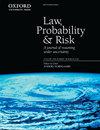Incorporating implicit knowledge into the Bayesian model of prior conviction evidence: some reality checks for the theory of comparative propensity
IF 1.4
4区 社会学
Q1 LAW
引用次数: 0
Abstract
The theory of comparative propensity, championed by the late Mike Redmayne, has been an influential theory underpinning normative models of the probative value of evidence of previous convictions in criminal trials. It purports to generalize an approximate probative value by means of a Bayesian model in which the likelihood of an innocent person having a criminal record is calculated by reference to general population statistics, and the hard evidence underpinning the prior probability is treated as unknown. The theory has been criticized on the ground that it fails to take account of bias against past offenders in the selection of cases for prosecution. This article analyses the model and these criticisms and concludes that both the model and the criticisms are flawed because they fail to address the evidence on which the prior odds are based. We find that, not only are such mathematical models unsound, but they can only be ‘repaired’ by making assumptions about the typical case which run counter to the legal presumption of innocence. Analysing the flaws in these models, however, does provide some insight into issues affecting the value of prior convictions evidence.将内隐知识纳入先验定罪证据的贝叶斯模型:比较倾向理论的一些现实检验
由已故的迈克·雷德梅恩倡导的比较倾向理论一直是一个有影响力的理论,支撑着刑事审判中先前定罪证据证明价值的规范模型。它旨在通过贝叶斯模型来概括一个近似的证明价值,在贝叶斯模型中,无辜者有犯罪记录的可能性是通过参考一般人口统计来计算的,而支持先前概率的确凿证据被视为未知。该理论受到批评,理由是在选择起诉案件时没有考虑到对过去罪犯的偏见。本文分析了该模型和这些批评,并得出结论,该模型和批评都有缺陷,因为它们未能解决先前赔率所依据的证据。我们发现,这种数学模型不仅不健全,而且只能通过对典型案件进行与法律无罪推定相悖的假设来“修复”。然而,分析这些模型中的缺陷确实可以深入了解影响前科证据价值的问题。
本文章由计算机程序翻译,如有差异,请以英文原文为准。
求助全文
约1分钟内获得全文
求助全文
来源期刊

Law Probability & Risk
MATHEMATICSSTATISTICS & PROBABILITY&-STATISTICS & PROBABILITY
CiteScore
2.10
自引率
28.60%
发文量
8
期刊介绍:
Law, Probability & Risk is a fully refereed journal which publishes papers dealing with topics on the interface of law and probabilistic reasoning. These are interpreted broadly to include aspects relevant to the interpretation of scientific evidence, the assessment of uncertainty and the assessment of risk. The readership includes academic lawyers, mathematicians, statisticians and social scientists with interests in quantitative reasoning.
The primary objective of the journal is to cover issues in law, which have a scientific element, with an emphasis on statistical and probabilistic issues and the assessment of risk.
Examples of topics which may be covered include communications law, computers and the law, environmental law, law and medicine, regulatory law for science and technology, identification problems (such as DNA but including other materials), sampling issues (drugs, computer pornography, fraud), offender profiling, credit scoring, risk assessment, the role of statistics and probability in drafting legislation, the assessment of competing theories of evidence (possibly with a view to forming an optimal combination of them). In addition, a whole new area is emerging in the application of computers to medicine and other safety-critical areas. New legislation is required to define the responsibility of computer experts who develop software for tackling these safety-critical problems.
 求助内容:
求助内容: 应助结果提醒方式:
应助结果提醒方式:


